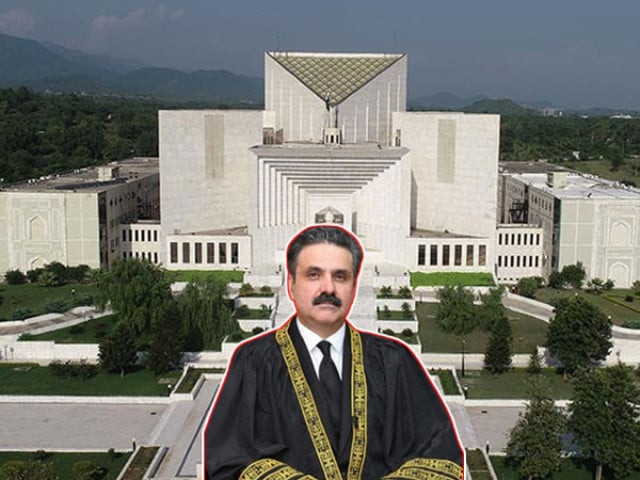ZA Bhutto case 'a dark chapter' in Pakistan's Judicial history: CJP Afridi
CJ agrees with Justice Shah's remarks, acknowledging flaws in Bhutto trial and urging judicial integrity reforms

Chief Justice Yahya Afridi has raised concerns about significant lapses in the trial of former Prime Minister Zulfikar Ali Bhutto, terming the case a "dark chapter" in Pakistan’s judicial history.
In an additional note, Justice Afridi partially agreed with Justice Mansoor Ali Shah’s observations regarding the infamous trial, Express News reported.
Justice Afridi noted that while he reviewed the opinions of former Chief Justice Qazi Faez Isa and other judges, he largely agreed with Justice Shah’s remarks. However, he emphasised that the Supreme Court’s advisory jurisdiction under Article 186 limits its scope in such matters.
Referring to the trial’s flaws, the chief justice observed that both the trial court and appellate court had failed to uphold fair trial standards.
He highlighted procedural breaches, stating that under Pakistan’s criminal procedure laws, a murder trial could not have been directly conducted in the high court.
Afridi further pointed out that former Chief Justice Nasim Hasan Shah, now deceased, had admitted to external pressures influencing the verdict in the Bhutto case.
He called this revelation a “regrettable chapter” in Pakistan’s judicial history, undermining public trust in the judiciary.
The chief justice praised dissenting judges of the time, including Justices Dorab Patel, Mohammad Haleem, and Safdar Shah, for their courageous stand against the prevailing pressures.
Although their dissenting notes did not alter the outcome, Afridi said they upheld the judiciary’s impartiality and underscored its critical role in maintaining the rule of law.
Justice Afridi concluded that Zulfikar Ali Bhutto trial lacked due process, cautioning that failure to address such miscarriages of justice could continue to erode public confidence in the legal system.
SC declares Zulfiqar Ali Bhutto's rights were violated, trial lacked fairness
In July, then Chief Justice of Pakistan (CJP) Qazi Faez Isa had declared Zulfiqar Ali Bhutto innocent, stating that he was sentenced to death by unconstitutional courts with insufficient evidence.
In detailed remarks on the Zulfiqar Ali Bhutto reference issued, it was stated that an innocent person was executed without a fair trial, as reported by Express News on Monday.
At the time of Bhutto's trial, the courts lacked constitutional legitimacy, the country was under martial law, and fundamental rights were suspended, it maintained, adding that the judiciary was also subservient to martial law.
The order emphasised that courts under judges who swore allegiance to a dictator do not remain courts of the people. The execution of Bhutto directly benefited General Zia-ul-Haq. If Bhutto had been released, he could have pursued serious treason charges against the dictator.
CJP remarked that the reference took 11 years to be scheduled for a hearing. All judges who initially heard the reference retired, and the evidence for the death sentence was insufficient. There was no direct evidence under Section 302 against Bhutto, it added.
The Supreme Court clarified that Bhutto's execution was neither a presidential reference appeal nor a review request. The constitution or law does not provide a mechanism to nullify such a sentence. After the Supreme Court dismissed the review, the decision became final.
The opinion states that a presidential reference cannot overturn a final decision. The Federal Investigation Agency began investigations into the Bhutto case before receiving the case file.
Once the police investigation was complete, the FIA had no authority to reopen the file. There was no judicial order for re-investigating the Bhutto case, and the High Court's trial process undermined several legal provisions.
The court noted that Bhutto's fundamental rights were violated by those responsible for protecting them. The trial did not meet the standards of fairness, and there was no direct evidence against Bhutto. The Supreme Court highlighted the non-transparent, illegal, and unconstitutional flaws in Bhutto's case.
The murder charge was attributed to a force called FSF, and the shell casing from the crime did not match FSF weapons. Bhutto's speeches in parliament were also used against him, which is not permissible.
The remarks further stated that Bhutto was transferred without notice, and for the first time in Pakistan's judicial history, a murder trial was directly conducted in the Lahore High Court. This unprecedented move deprived Bhutto of the right to appeal.
Such a direct trial by the High Court is unheard of in Asia, where no other instance exists of a High Court conducting a direct murder trial.
CJP Isa mentioned that Justices Sardar Tariq Masood, Mansoor Ali Shah, Jamal Khan Mandokhail, and Ali Mazhar will provide additional notes on the reference.



















COMMENTS
Comments are moderated and generally will be posted if they are on-topic and not abusive.
For more information, please see our Comments FAQ